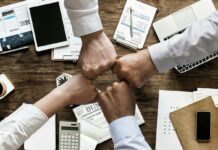We’ve all been there. You’ve been working on a big project, staying late at the office every day and answering emails from your home computer to make sure everything is running smoothly, but it’s catching up with you. Workplace burnout. It’s a common ailment felt by many Americans when you’ve overexerted yourself at work and now you’re feeling the effects. If you think you might be suffering from workplace burnout, there are plenty of ways to overcome this–from taking time to work on hobbies like diamond painting to getting yourself out there exercising. Learn more about burnout and how to recover with these tips.
What Is Workplace Burnout?
Although “burnout” isn’t a medical term, there are some medical side effects that come along with experiencing burnout. This phrase refers to a very specific type of stress that has been caused by fatigue in the workplace. You might be working too many hours or focusing too much of your mental energy on your job. Common symptoms of workplace burnout include difficulty concentrating on the task at hand, trouble sleeping or altered sleeping patterns, feelings of impatience or annoyance with colleagues and a lack of satisfaction from your work.
How Does It Impact Your Mental Health?
Workplace burnout can greatly impact your mental (and physical) health because it takes a toll on your mind. When you’re constantly worrying and thinking about one thing, it can become overwhelming to your brain. Some experts believe that workplace fatigue may be caused by other underlying disorders that have become accentuated by overworking yourself. Depression and anxiety are two mental conditions that are closely associated with workplace burnout and can make it even more difficult to focus on your work and get the job done.
Unfortunately, workplace fatigue also has some physical consequences, like an increased risk for certain diseases like Type 2 diabetes and high blood pressure. People who suffer from prolonged workplace fatigue are also at risk of developing a tendency to abuse drugs or alcohol. Don’t let yourself suffer because of your unsatisfactory work life. Try implementing these tips, and if none of these suggestions begin helping, it might be time to consider a career change.
How to Beat Workplace Burnout
- Ask for Help When You Need It
Unfortunately, many of us are stubborn–especially when it comes to our work or our responsibilities. We feel as though we should be able to do something entirely by ourselves if we were given the task. But, that’s not exactly how life works. There are plenty of times when you’re going to need to ask for help, and it’s okay to do this at work. Maybe you need additional resources or more time or even another colleague to collaborate with. Set up a time to talk to your direct supervisor and express your feelings of stress and fatigue and offer a solution that would help take some of the pressure off you.
It’s normal to feel nervous that asking for help will make you look less qualified, but this is not the case at all. Knowing when you need help or more support shows that you’re aware of your abilities and not afraid to stand up and ask for something you need. Any reasonable boss will understand.
- Know Your Abilities
If you really care about your job, you may have the tendency that many of us have to willingly accept new projects and assignments even though you don’t necessarily have the time to take them on. When someone offers a new project, it can make us feel good because it means that our supervisor trusts us and wants to pass along more responsibility, but it’s important to ask yourself, “Do I have time to get this done right now?” Realistically think about it and review your calendar before blindly saying yes. Believe us, you’re not going to disappoint your boss. In fact, he or she will likely be impressed that you are able to balance your schedule enough to know your boundaries.
If your boss still wants you on the project, but you don’t necessarily have time right now, ask him or her to sit down with you to create a solution and a timeline that will prevent you from becoming fatigued while also getting the job done.
- Don’t Take Your Work Home with You
Not just physically, but mentally, too. Stop answering work emails after work hours. You shouldn’t be expected to complete work when you’re not technically getting paid. It’s unfair to you as an employee and it reduces your ability to create a solid work-life balance, which in turn will cause job burnout. Avoid checking and responding to work emails once you’ve left the office for the day and try to keep your computer out of sight unless you’re using it for something fun like browsing the internet or online shopping. If possible, it’s best to keep your work computer at work and your home computer at home so you aren’t tempted to try finishing up a work project while you’re hanging out on the couch at night. Instead of work, make time to work on a fun activity, such as diamond painting, drawing, reading, cooking—whatever makes you happy and takes your mind off work.
- Take Breaks
This is one of the biggest mistakes people make that can easily lead to workplace burnout. So many people are used to working straight through lunch, bringing their meal to their desk so that they can shovel food into their mouths while still typing away at the computer. This is actually less productive than just taking a 30-minute break and returning to your work because breaks have been proven to increase productivity and reduce stress.
Keep Yourself Happy, Healthy and Proactive
The only way to avoid workplace fatigue is by actively taking steps to create a healthy work-life balance and stop overcommitting to projects. Take on the amount of work that you know you can handle and then leave work at work so you’re not stressing yourself about it 24/7. Remember to take breaks to give your brain time to recharge and relax. Then, you’ll be more ready than ever to take on the next workday.




